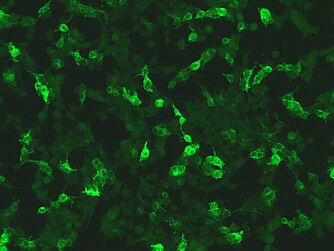Clinical information
The most important chronic inflammatory bowel diseases (CIBD) include ulcerative colitis (UC) and Crohn’s disease (CD).
Ulcerative colitis (UC) belongs to the CIBD with autoimmune reactions against the mucosa and submucosa of the colon or rectum and increased immune reactions against the intestinal flora. It is assumed that there is a genetic susceptibility to UC and that it may also be caused by certain environmental factors. The inflammation spreads continuously from the rectum, i.e. from anal to oral.
CD is classified as an autoimmune disease of the intestinal mucosa and is among the CIBD with a high recurrence rate. The chronic granulomatous inflammation, which can affect the whole digestive tract from the oral cavity to the anus, is found in most cases only in the lower small intestine (terminal ileum) and the large intestine (colon), very rarely in the oesophagus and mouth. A discontinuous, segmental attack on the intestinal mucosa, which may affect several separate sections of the intestine simultaneously, is characteristic for CD.
Diagnostics

Initial differentiation between irritable bowel syndrome (IBS) and CIBD is possible by non-invasive antigen detection of calprotectin in stool, which thus allows a crucial precharacterisation of intestine-associated inflammations (see chapter “Calprotectin”). The high diagnostic requirements of a differentiated CIBD determination are met by IIF single assays as well as by various highly specific mosaics (CIBD profiles), which have been developed especially for serological diagnostics of CD and UC.
Autoantibodies against the exocrine pancreas are a reliable marker for CD. They have a high disease-specific significance due to their organ specificity, disease association and frequently high serum concentration. Since the inflammation of the intestinal wall in CD is caused by the autoantigens contained in the pancreas secretion, particularly the proteoglycans CUZD1 and GP2, the determination of autoantibodies against the pancreas antigens rPAg1 (CUZD1) and/or PAg2 (GP2) using IFA represents a new dimension in serological CD diagnostics. Anti-Saccharomyces cerevisiae antibodies (ASCA) are another specific parameter that supports serological CD diagnostics.
Autoantibodies against intestinal goblet cells, which occur exclusively in UC, are pathognomonic markers for this autoimmune disease. The target antigen responsible for UC has not yet been exactly identified. The serological determination of autoantibodies against DNA-bound lactoferrin contributes significantly to the diagnosis of CIBD, particularly of UC.
Files
Calprotectin - Marker for inflammatory activity in the intestine
Chronic inflammatory bowel diseases


















